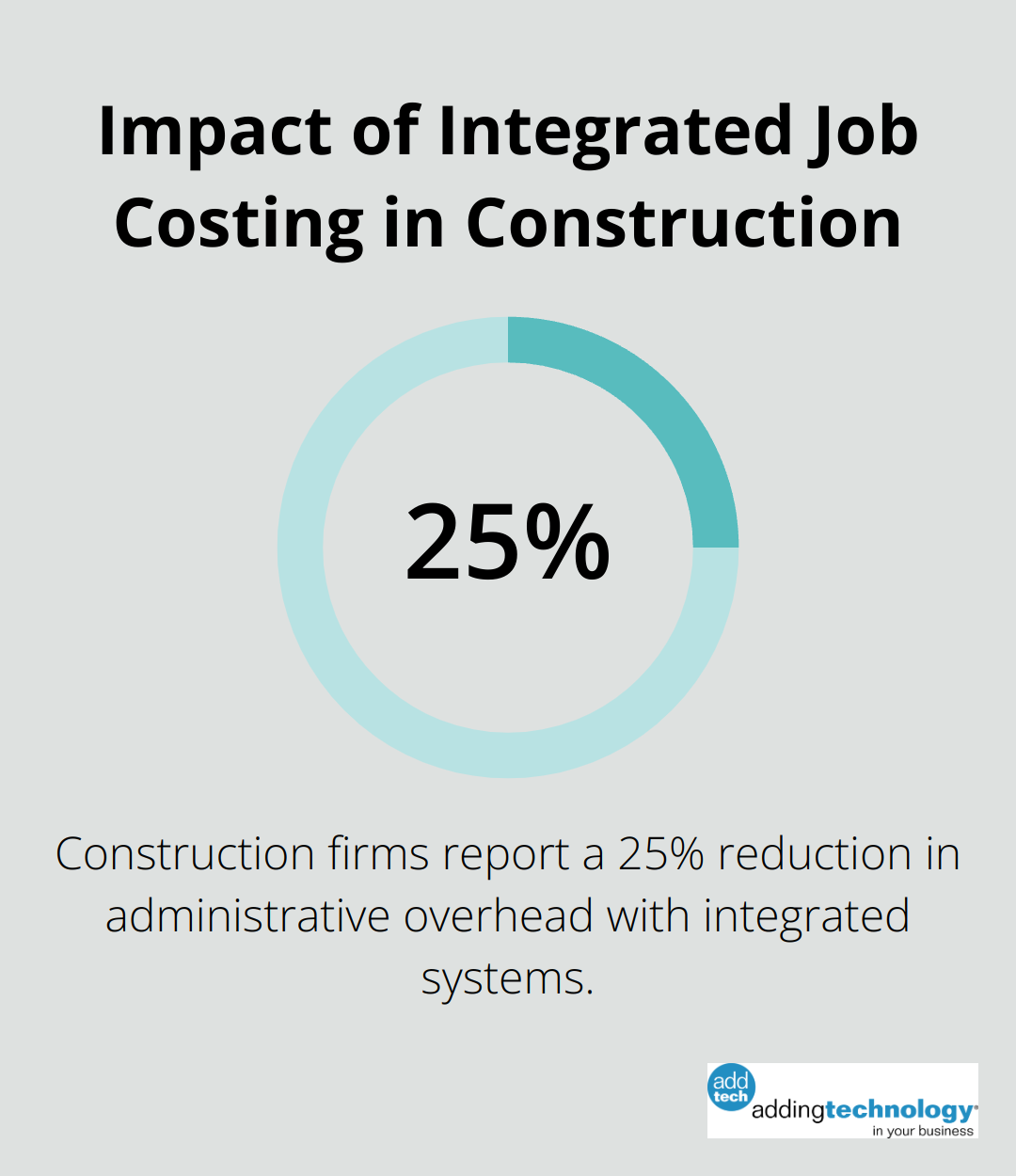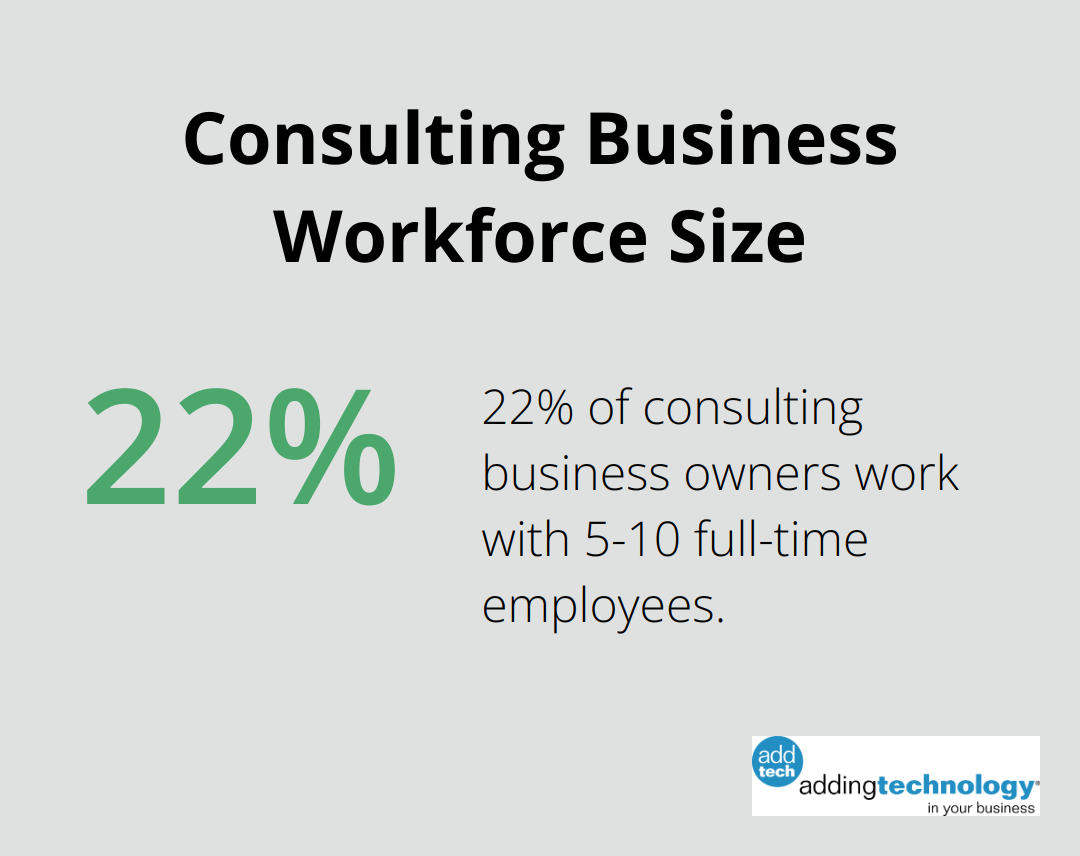
Job costing is a critical financial tool for many businesses across various sectors. At adding technology, we’ve observed that industries where job costing is used often share a common need for precise cost tracking and project management.
From construction sites to manufacturing floors and professional service firms, accurate job costing can make or break a company’s profitability. In this post, we’ll explore the key industries that rely on job costing and why it’s so important for their success.
Construction projects involve multiple moving parts and variables. Job costing allows contractors to break down these complexities into manageable financial units. A high-rise building project, for example, can be dissected into foundation work, structural framing, electrical systems, and finishing touches. Each component requires specific resources and budgets, which job costing helps to allocate and track accurately.
Modern job costing in construction offers real-time tracking as one of its most significant advantages. Project managers can now monitor costs as they occur, rather than waiting for monthly reports. This immediate visibility enables quick decision-making and course corrections when necessary.
Up-to-date cost data allows for immediate awareness of budget status, helping project managers see if their project is drifting off course.
Accurate estimates form the foundation of successful construction businesses. Job costing provides historical data that proves invaluable for creating precise bids. Contractors can better predict labor costs, material needs, and potential overheads for new jobs by analyzing past projects.
Job costing in the construction industry is beneficial for pinpointing the accuracy of cost estimates and identifying cost deviations from the quote or budget.
Job costing isn’t just about tracking expenses; it maximizes profitability. Contractors can make informed decisions to improve their bottom line by identifying cost overruns early and understanding which aspects of a project are most profitable.
For instance, a mid-sized construction firm discovered through detailed job costing that their electrical subcontracting consistently reduced profits. They increased overall project profitability by 7% through rate renegotiation and improved scheduling.
The integration of job costing with project management software has revolutionized construction company operations. Mobile apps now allow workers to log hours and materials used directly from the job site, ensuring up-to-the-minute accuracy in cost tracking.
The Construction Financial Management Association notes that firms using integrated job costing and project management systems report a 25% reduction in administrative overhead.

In the dynamic world of construction, cost management is non-negotiable. Job costing provides the financial clarity needed to deliver projects on time and on budget, turning potential losses into profitable ventures. As we shift our focus to the manufacturing sector, we’ll explore how job costing principles apply in a different, yet equally complex, industry environment.
Job order costing transforms operations in custom manufacturing scenarios. An aerospace parts manufacturer implemented job costing for their bespoke components. This allowed them to track costs for each unique order, from raw materials to specialized labor hours. Innovative strategies for aerospace manufacturers can enhance production efficiency and minimize costs without compromising quality and safety.
While job costing excels for custom work, process costing takes center stage in mass production. A large-scale food processing plant adopted this approach, assigning costs to each stage of production. They discovered that their packaging process consumed profits. By optimizing this step, they reduced overall production costs by 8%.

Accurate cost allocation forms the backbone of manufacturing profitability. A medium-sized furniture maker struggled with pricing until they implemented a robust job costing system. Precise tracking of direct costs (like wood and fabric) and allocation of indirect costs (such as factory overhead) improved their pricing strategy. This led to a 20% increase in profitability on their product lines.
Effective inventory management often goes overlooked but proves crucial for manufacturing success. An electronics manufacturer experienced cash flow issues due to excess inventory. Integration of job costing with inventory management reduced their inventory holding costs by 30% and significantly improved their cash position.
Modern manufacturing relies heavily on technology to streamline job costing processes. ERP systems integrate with job costing software to provide real-time insights into manufacturing processes, facilitate quick adjustments to demand changes, and enable better decision-making. This integration allows manufacturers to make data-driven decisions quickly, optimizing production schedules and resource allocation.
The manufacturing sector presents complex costing challenges, but the right job costing approach transforms these challenges into opportunities for increased efficiency and profitability. As we shift our focus to service-based businesses, we’ll explore how these principles apply in a completely different business environment, where intangible assets and billable hours take center stage.
Law firms succeed or fail based on their ability to accurately track and bill for their time. Demand growth metrics report the year-over-year change in total billable hours for the average law firm during the period examined. This increase directly translates to higher revenue and profitability.
Top-performing law firms use job costing to break down complex cases into manageable components. For example, a corporate merger might be divided into due diligence, contract negotiation, and regulatory compliance phases. Each phase has its own budget and billable hour targets, which allows for precise cost control and client billing.
Management consultancies rely heavily on job costing to ensure project profitability. In 2022, consultants work with more full-time employees and contractors compared to 2018. 22% of the consulting business owners work with between 5-10 full-time employees.

Successful consultancies assign costs not just to billable hours, but also to research time, travel expenses, and even the opportunity cost of assigning top talent to specific projects. This comprehensive approach allows them to price their services more accurately and identify which types of projects yield the highest returns.
Creative agencies face the challenge of quantifying creative work. Leading agencies use job costing to track time spent on ideation, execution, and client revisions separately. This granular approach helps identify which parts of the creative process are most time-consuming and allows for more accurate future project estimates.
In the fast-paced world of IT services and software development, job costing is essential for managing complex projects. Effective IT service providers use job costing to track not just developer hours, but also the cost of software licenses, cloud computing resources, and ongoing maintenance. This comprehensive view allows for more accurate pricing of both initial development and long-term support contracts.
Job costing in service-based businesses requires a deep understanding of the unique value each professional brings to a project. While manufacturing might track the cost of raw materials, service businesses must quantify expertise, creativity, and problem-solving skills (which are often intangible assets). The most successful firms in these industries have mastered this balance, using job costing not just as a financial tool, but as a strategic asset for growth and client satisfaction.
Industries where job costing is used span from construction sites to creative agencies, each benefiting from precise financial tracking. Job costing provides the foundation for profitability and growth, enabling businesses to make informed decisions quickly based on real-time data analysis. As competition intensifies, mastering job costing will remain a key differentiator for successful businesses across various sectors.
We at Adding Technology understand the critical role of job costing in construction business success. Our expert accounting and financial management services streamline financial processes, ensuring accurate, real-time data for informed decision-making. We handle the financial intricacies that drive profitability, allowing you to focus on building great projects.
Exciting developments in job costing technology (such as AI integration) promise to enhance predictive capabilities and improve real-time collaboration. Those who embrace this powerful financial tool and adapt to emerging technologies will thrive in an increasingly complex business landscape. Our expertise and advanced solutions position your business for success in this evolving environment.









At adding technology, we know you want to focus on what you do best as a contractor. In order to do that, you need a proactive back office crew who has financial expertise in your industry.
The problem is that managing and understanding key financial compliance details for your business is a distraction when you want to spend your time focused on building your business (and our collective future).
We understand that there is an art to what contractors do, and financial worries can disrupt the creative process and quality of work. We know that many contractors struggle with messy books, lack of realtime financial visibility, and the stress of compliance issues. These challenges can lead to frustration, overwhelm, and fear that distracts from their core business.
That's where we come in. We're not just accountants; we're part of your crew. We renovate your books, implement cutting-edge technology, and provide you with the real-time job costing and financial insights you need to make informed decisions. Our services are designed to give you peace of mind, allowing you to focus on what you do best - creating and building.
Here’s how we do it:
Schedule a conversation today, and in the meantime, download the Contractor’s Blueprint for Financial Success: A Step by-Step Guide to Maximizing Profits in Construction.” So you can stop worrying about accounting, technology, and compliance details and be free to hammer out success in the field.